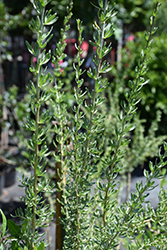It's all about ...
plants

Height: 6 feet
Spread: 5 feet
Sunlight:
![]()
![]()
Hardiness Zone: 8b
Other Names: Carolina Desert-thorn, Christmasberry
Description:
A thorny, upright spreading shrub, featuring long, flexible canes with clusters of small, succulent gray-green leaves; pretty lavender and white flowers appear in late summer, followed by showy red fruit in winter
Ornamental Features
Carolina Wolfberry is draped in stunning lavender trumpet-shaped flowers with white throats along the branches from late summer to mid fall, which emerge from distinctive creamy white flower buds. It has attractive grayish green deciduous foliage. The small succulent oval compound leaves are highly ornamental but do not develop any appreciable fall colour. It features an abundance of magnificent red berries from early to mid winter.
Landscape Attributes
Carolina Wolfberry is a multi-stemmed deciduous shrub with a shapely form and gracefully arching branches. Its relatively fine texture sets it apart from other landscape plants with less refined foliage.
This shrub will require occasional maintenance and upkeep, and is best pruned in late winter once the threat of extreme cold has passed. It is a good choice for attracting birds, bees and butterflies to your yard, but is not particularly attractive to deer who tend to leave it alone in favor of tastier treats. Gardeners should be aware of the following characteristic(s) that may warrant special consideration;
- Spiny
Carolina Wolfberry is recommended for the following landscape applications;
- Accent
- Hedges/Screening
- General Garden Use
- Naturalizing And Woodland Gardens
- Container Planting
Planting & Growing
Carolina Wolfberry will grow to be about 6 feet tall at maturity, with a spread of 5 feet. It has a low canopy, and is suitable for planting under power lines. It grows at a medium rate, and under ideal conditions can be expected to live for 40 years or more. This is a self-pollinating variety, so it doesn't require a second plant nearby to set fruit.
This shrub does best in full sun to partial shade. It is very adaptable to both dry and moist growing conditions, but will not tolerate any standing water. It is considered to be drought-tolerant, and thus makes an ideal choice for xeriscaping or the moisture-conserving landscape. This plant should not require much in the way of fertilizing once established, although it may appreciate a shot of general-purpose fertilizer from time to time early in the growing season. It is not particular as to soil type or pH. It is highly tolerant of urban pollution and will even thrive in inner city environments. This species is native to parts of North America..
Carolina Wolfberry makes a fine choice for the outdoor landscape, but it is also well-suited for use in outdoor pots and containers. Because of its height, it is often used as a 'thriller' in the 'spiller-thriller-filler' container combination; plant it near the center of the pot, surrounded by smaller plants and those that spill over the edges. It is even sizeable enough that it can be grown alone in a suitable container. Note that when grown in a container, it may not perform exactly as indicated on the tag - this is to be expected. Also note that when growing plants in outdoor containers and baskets, they may require more frequent waterings than they would in the yard or garden. Be aware that in our climate, most plants cannot be expected to survive the winter if left in containers outdoors, and this plant is no exception. Contact our experts for more information on how to protect it over the winter months.
This plant is not reliably hardy in our region, and certain restrictions may apply; contact the store for more information.
